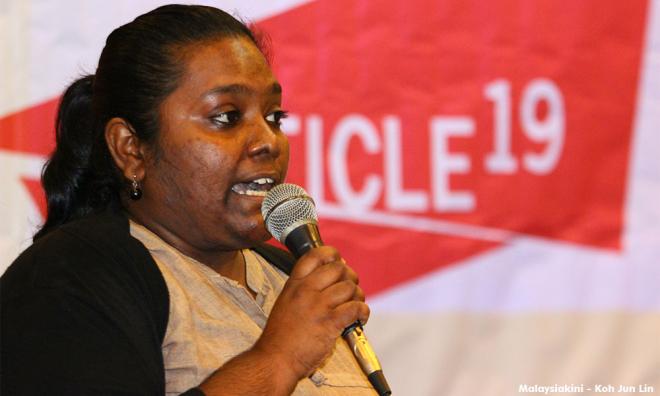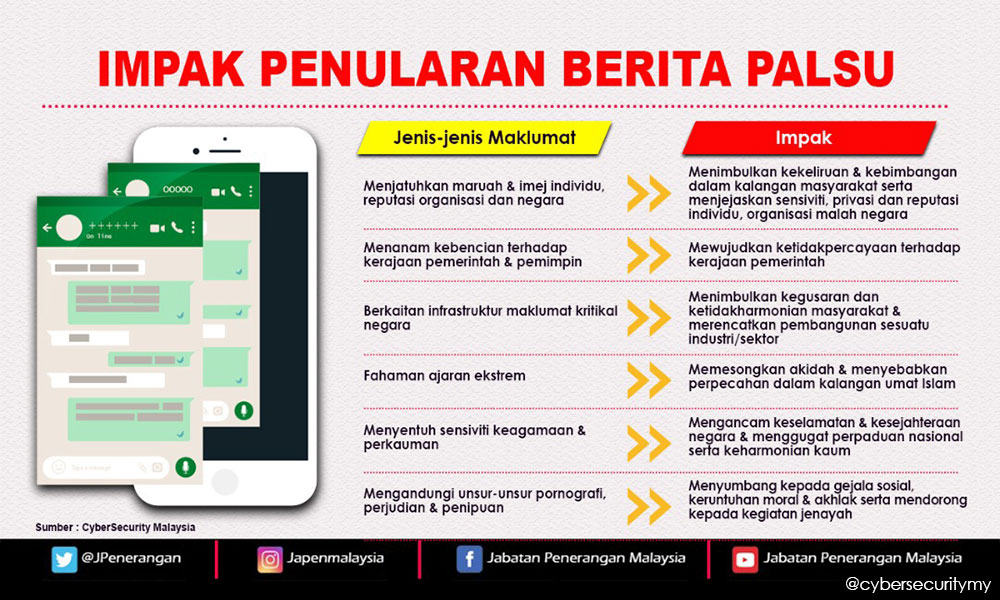
Several groups advocating freedom of expression and press freedom have expressed their concern over the Information Department's attempt at raising awareness on the sharing of fake news and its impacts.
While acknowledging the dangers of false information in times of crisis, the groups noted that the government's definition of fake news was "unclear and confusing".
In particular, international human rights organisation Article 19 programme officer Nalini Elumalai (photo) highlighted the department's classification of information that "instils hatred towards the government and leaders" as fake news that could "cause confusion, trigger unrest, and negatively affect a person, an organisation or the country's reputation as a whole".
"Fake news should not shield the government and leaders from criticism as it will leave a chilling effect on freedom of expression and potential critics.
"Furthermore, the government and its leaders have access to other means and remedies, such as responses to criticisms through media or official channels," she told Malaysiakini.
The Information Department yesterday tweeted the alert from Cyber Security Malaysia, listing out six categories of information classified as fake news and its impacts if left unchecked, particularly as the country is battling the Covid-19 outbreak.

Nalini, however, stressed on the importance of public discourse when it comes to scrutinising government conduct during a public health crisis.
"No one should be punished for merely expressing a critical opinion about the government and leaders," she said.
Meanwhile, media freedom advocacy group Gerakan Media Merdeka (Geramm) said the government's descriptions of fake news was "unclear and confusing".
"Such descriptions could trigger confusion among various quarters on the real definition of fake news.
"The confusion could lead to unreasonable actions by certain parties, particularly the authorities, in managing the spread of information deemed as false," Geramm said in a statement.
The Information Department listed out six categories of fake news that could contain elements of extremist teachings, racial-religious sensitivities, pornography or online gambling.
Geramm, however, argued that not all information identified as "tarnishing reputation of an individual, organisation or the nation" can be classified as fake news.
"Tarnishing reputation or image is a subjective matter that depends on how an individual or an organisation view their reputation," said the group, which in 2018, had mounted a Twitter campaign against the now-repealed Anti-Fake News Act.
"Geramm is also of the view that something which 'touches on racial and religious sensitivities' should not be defined as fake news.
"In a multi-racial country with varied cultural backgrounds such as Malaysia, racial-religious sensitivities must be viewed with sanity and maturity," said Geramm.
"It is not impossible for something accepted as a norm by one religion or ethnic group, to be considered sensitive by another group," it added.
Contrary to the government's aim of raising awareness, Geramm said the Information Department's "confusing" message could impede efforts to curb disinformation or misinformation.
Meanwhile, the Centre for Independent Journalism (CIJ) pointed out that "fake news" in itself is an inaccurate concept as news is usually understood as reliable information and its source verifiable.
"As such, the term 'fake news' is an oxymoron as news, as such, cannot be fake," said CIJ executive director Wathshlah G Naidu, in urging for the focus to be shifted towards understanding the differences between misinformation and disinformation.

Unlike the broad blanket of fake news, Whatshlah explained that the difference between misinformation and disinformation lies with establishing whether there was an intent to deceive its intended recipients.
"Besides that, the harm test must always be adhered to in determining if the disinformation was intended to mislead and did lead to undermining individual reputations and privacy or incite to violence, discrimination or hostility against specific groups or community.
"General dissent or questioning of public institutions leading to distrust of the said institution would not necessarily meet the harm test," she said.
Rather than resorting to taking action under the law, the CIJ said the government should continue efforts by the Health Ministry and the Communication and Multimedia Ministry to educate the public and guarantee the right to information.
"This includes unencumbered access to a wide source of information and ideas that would facilitate public debates and enable informed opinions," said Whatshlah.
Since the enforcement of the movement control order on March 18, Defence Minister Ismail Sabri Yaakob yesterday revealed that the police and the Malaysian Communications and Multimedia Commission have opened 207 investigation papers on Covid-19-linked fake news.
Of the figure, 23 cases have been charged in court. - Mkini


No comments:
Post a Comment
Note: Only a member of this blog may post a comment.